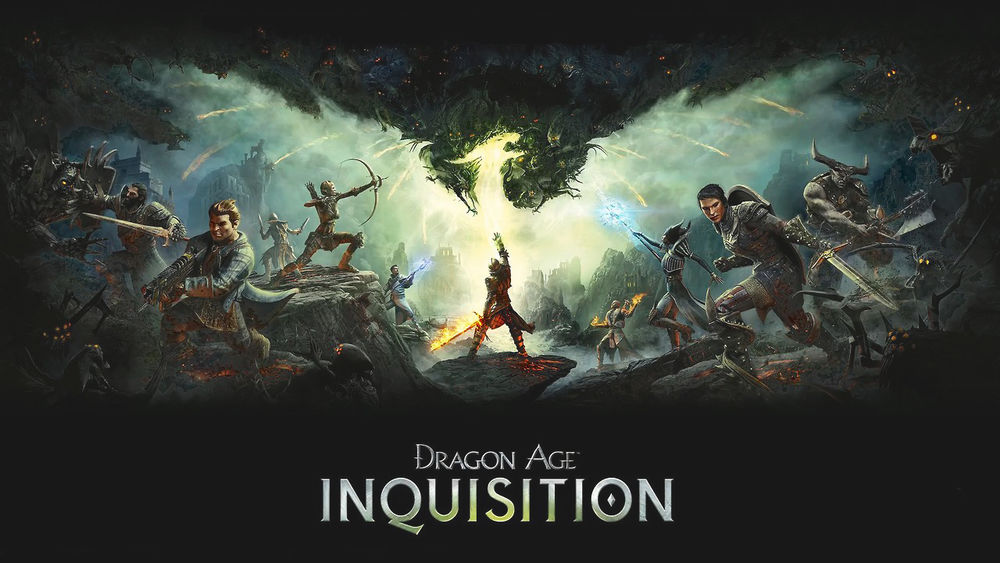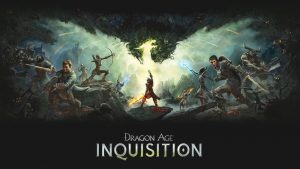
Dragon Age: Inquisition is the third entry in BioWare’s fantasy role-playing game series, released in 2014 on PS3, PS4, X-Box 360, X-Box 1 and PC. It starts during a war across the continent of Thedas between the oppressed Mages and their jailers, the Templar Order. A peace conference is called at a holy temple by the religious head, the Divine, which goes horribly wrong as an explosion destroys the temple and tears a hole in the sky, leaving only one survivor: You. You must now build up the newly formed Inquisition with your allies to stop the war, and find those responsible for opening the sky and killing the Divine.
The game is in third-person, and allows you to choose from four different races to play as: Human, Evlen, Dwarf or the horned giant Qunari, and one of three classes: Warrior, Mage or Rogue. It features a standard levelling system, allowing you to purchase new upgrades as you level. You play with a party of up to three companions, with more unique and different companions being recruited along your travels.
Control and Gameplay
The game is divided into ten geographic areas of varying size (plus two DLC areas), climate and landscape, with special areas for the main story missions, a home base for the Inquisition, and the city market of Val Royeaux. Some of the areas are too large and empty due to the lack of quests or anything meaningful, but others are well populated and not too big. Larger areas may be forgiven for how nice the environments look.
The game uses standard movement controls, with number-key bindings for abilities and potions. It also features a pause system, and unlike previous entries a jump ability. There is also a horse/mount system, allowing you to call a mount to ride through the world quicker. The game also allows you to swap between the companions in your party, to control them as you would your own character, allowing for more tactical play.
The allies and companions you recruit will have a relationship with your character, changing based on your actions. There are a number of returning characters from previous games, with a large number of new ones too. They all have their own unique perspective on the world, which allows for deeper insight into the world. They can come to think of you as a good friend or hate you, or even romance some of them.
Graphics
The graphics are an improvement over previous games, possibly due to the transition into the high-quality Frostbite engine. The graphics are standard for the time of release, but look noticeably worse on older consoles and PCs.
Sound
The sound work on Inquisition is good, with a variety of sounds that fit well into the game, such as combat, dialogue and the ambient sounds of the different areas. The music is composed by Inon Zur, who has worked on the Fallout series before. There are several identifiable songs at key moments in the game that fit well.
Fun Factor
The game’s combat is quick to understand, and allows for advanced tactics to destroy enemies, with few tanky enemies on the lower difficulties, but on higher difficulties the enemies just have more health, resulting in a fun combat system overall that can drag on a bit on the higher difficulties.
The highlights of the game are the story missions. My favourite is ‘Wicked Eyes and Wicked Hearts’, with its unique structure of a masquerade with politics, mystery and murder.
The main villain is a bit weak, but the lesser villains and his main generals are much more interesting, with most having interesting and understandable backstories.
Your companions develop relationships with you based on how you play, so finding your favourites to take with you is an option, and companions will occasionally have conversations while exploring the world.
Replayability
The different classes provide different play styles for you to try out, and one earlier choice in the game provides a few differences including different major quests based on your choice. Most of the areas are optional, so any you ignore on your first play through can be explored in a later one. Your companions have personal quests with different outcomes, so seeing these different outcomes might be something you’d want to see.
Overall an enjoyable game. It’s accessible to those new to the series, while serving as a good sequel for fans of Dragon Age.


